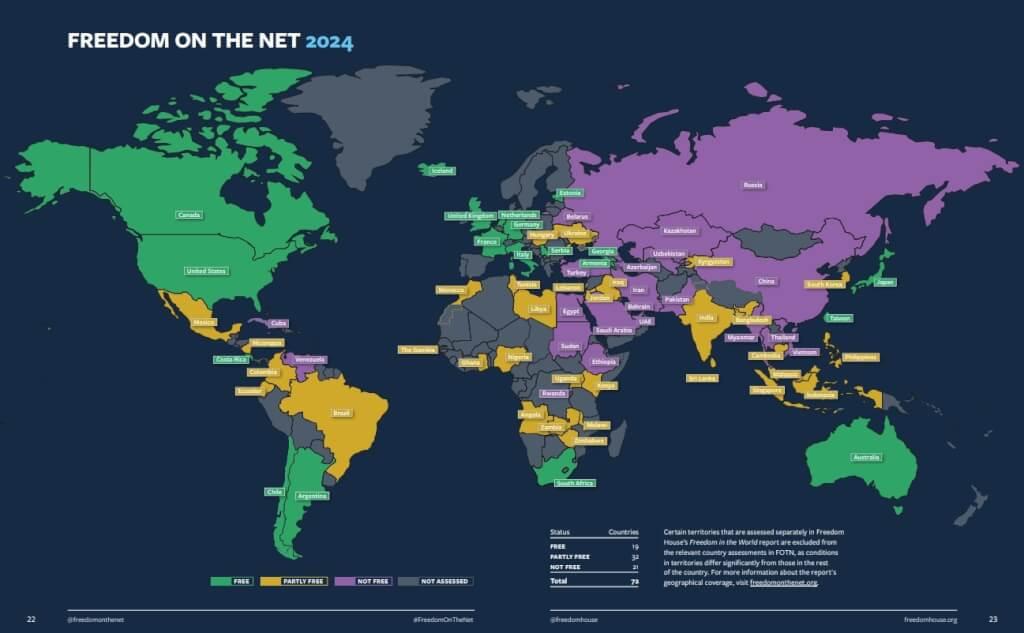Taiwan had the freest Internet in Asia in this year’s Freedom on the Net report, and the seventh freest globally.
Freedom House today published its annual report on Internet freedom in 72 countries worldwide.
With a total score of 79 out of 100, Taiwan’s Internet was considered “free” by the Washington-based research nonprofit, which is funded by the US Congress, but run independently.

Photo courtesy of Freedom House
The report praised Taiwan’s efforts to combat misinformation in the lead-up to January’s elections, saying its “transparent, decentralized and collaborative approach ... stands as a global model.”
It mentioned the ability for people to submit claims on the Cofacts platform for fact-checking by both professional and community contributors.
False narratives about foreign relations, especially relations with the US, were dominant on Line, the report said.
It also mentioned a law passed in June last year that allows candidates to report deepfakes of themselves to social media companies.
Overall, the report found that Internet freedom fell for the 14th straight year globally, with more countries seeing declines than rises.
Myanmar and China have the world's worst Internet freedom, with declines reported in a number of other countries led by Kyrgyzstan, the study found.
The further deterioration in Myanmar, a Beijing ally where the military seized power in 2021, marks the first time in a decade that any country has matched China for the lowest score in the report.
In Myanmar, the junta has harshly cracked down on dissent since ending a decade-long experiment in democracy, with systematic censorship and surveillance of online speech.
Freedom House pointed to new measures imposed by the junta in May to block access to virtual private networks, which residents use to bypass Internet controls.
China has developed a sweeping "great firewall" meant to root out content that poses a threat to the Chinese Communist Party.
Asked about the report, Beijing said its people "enjoy various rights and freedoms in accordance with the law."
"As for the so-called report, I think it is entirely baseless and made with ulterior motives," Chinese Ministry of Foreign Affairs spokeswoman Mao Ning (毛寧) said.
The country that showed the biggest drop in the survey was Kyrgyzstan, where authorities shuttered Web site Kloop, which is largely funded by US-based NGOs and had reported on allegations by an opposition leader of torture in custody.
Other countries downgraded included Azerbaijan — host of next month's COP29 climate summit — for detaining people over social media posts, and Iraq, where a prominent activist was slain after Facebook posts encouraging protests.
The biggest gains were seen in Zambia, with the report saying the country saw growing space for online activism.
Iceland was ranked the most free online, followed by Estonia and then Canada, Chile and Costa Rica.
The US held steady at 76 on a 100-point scale, with Freedom House renewing concern about the lack of safeguards against government surveillance.
It also pointed to actions by at least 19 US states against the misuse of artificial intelligence in election campaigns.

WANG RELEASED: A police investigation showed that an organized crime group allegedly taught their clients how to pretend to be sick during medical exams Actor Darren Wang (王大陸) and 11 others were released on bail yesterday, after being questioned for allegedly dodging compulsory military service or forging documents to help others avoid serving. Wang, 33, was catapulted into stardom for his role in the coming-of-age film Our Times (我的少女時代). Lately, he has been focusing on developing his entertainment career in China. The New Taipei District Prosecutors’ Office last month began investigating an organized crime group that is allegedly helping men dodge compulsory military service using falsified documents. Police in New Taipei City Yonghe Precinct at the end of last month arrested the main suspect,

A cat named Mikan (蜜柑) has brought in revenue of more than NT$10 million (US$305,390) for the Kaohsiung MRT last year. Mikan, born on April 4, 2020, was a stray cat before being adopted by personnel of Kaohsiung MRT’s Ciaotou Sugar Refinery Station. Mikan was named after a Japanese term for mandarin orange due to his color and because he looks like an orange when curled up. He was named “station master” of Ciaotou Sugar Refinery Station in September 2020, and has since become famous. With Kaohsiung MRT’s branding, along with the release of a set of cultural and creative products, station master Mikan

RISING TOURISM: A survey showed that tourist visits increased by 35 percent last year, while newly created attractions contributed almost half of the growth Changhua County’s Lukang Old Street (鹿港老街) and its surrounding historical area clinched first place among Taiwan’s most successful tourist attractions last year, while no location in eastern Taiwan achieved a spot in the top 20 list, the Tourism Administration said. The listing was created by the Tourism Administration’s Forward-looking Tourism Policy Research office. Last year, the Lukang Old Street and its surrounding area had 17.3 million visitors, more than the 16 million visitors for the Wenhua Road Night Market (文化路夜市) in Chiayi City and 14.5 million visitors at Tainan’s Anping (安平) historical area, it said. The Taipei 101 skyscraper and its environs —

Taiwan on Friday said a New Zealand hamburger restaurant has apologized for a racist remark to a Taiwanese customer after reports that it had first apologized to China sparked outrage in Taiwan. An image posted on Threads by a Taiwanese who ate at Fergburger in Queenstown showed that their receipt dated Sunday last week included the words “Ching Chang,” a racial slur. The Chinese Consulate-General in Christchurch in a statement on Thursday said it had received and accepted an apology from the restaurant over the incident. The comment triggered an online furor among Taiwanese who saw it as an insult to the